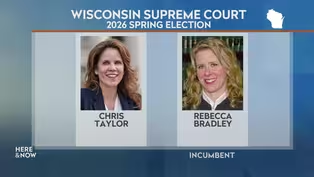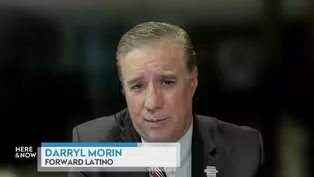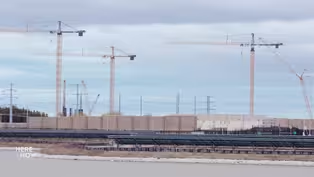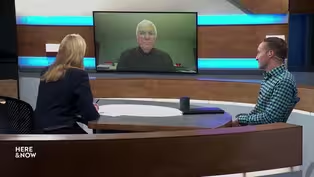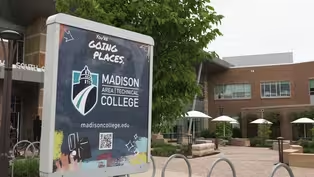Here and Now
Sen. Patrick Testin on Licensing of Advanced Practice Nurses
Clip: Season 2300 Episode 2345 | 5m 39sVideo has Closed Captions
Patrick Testin on allowing specialized nurses provide independent care in Wisconsin.
State Sen. Patrick Testin, R-Stevens Point, discusses legislation to create an advanced practice registered nurse license to allow trained specialized nurses to provide independent care in Wisconsin.
Problems playing video? | Closed Captioning Feedback
Problems playing video? | Closed Captioning Feedback
Here and Now is a local public television program presented by PBS Wisconsin
Here and Now
Sen. Patrick Testin on Licensing of Advanced Practice Nurses
Clip: Season 2300 Episode 2345 | 5m 39sVideo has Closed Captions
State Sen. Patrick Testin, R-Stevens Point, discusses legislation to create an advanced practice registered nurse license to allow trained specialized nurses to provide independent care in Wisconsin.
Problems playing video? | Closed Captioning Feedback
How to Watch Here and Now
Here and Now is available to stream on pbs.org and the free PBS App, available on iPhone, Apple TV, Android TV, Android smartphones, Amazon Fire TV, Amazon Fire Tablet, Roku, Samsung Smart TV, and Vizio.
Providing Support for PBS.org
Learn Moreabout PBS online sponsorshipyear term on the High Court.
Highly trained nurses in Wisconsin could soon be able to practice on their own, outside the supervision of physicians.
Under a bill gaining support at the state Capitol, the advanced Practice Registered Nurse Modernization Act just had a public hearing before the Assembly Health Committee, with physician groups formally opposed to the new licensure now formally neutral to the bill.
Governor Evers had vetoed the measure twice, but negotiated its terms with Republican sponsors.
Republican Patrick Teston of Stevens Point is Senate sponsor of the bill, and he joins us now.
And thanks very much for being here.
>> Thanks for having me.
>> So what would this new advanced practice, registered nurse licensure >> So the Aprn Modernization Act has been introduced over the course of the last decade and a half in some form or fashion.
It's taken different approaches and routes, and I've been the co-sponsor of it the last two sessions.
But ultimately, what this agreed upon bill will do will allow Perez after four years of experience, to practice independently without having to have a collaborative agreement with a physician.
On top of that, despite the fact that this was vetoed last two sessions, we've had very good conversations with various stakeholders, along with the governor's office to alleviate some of the concerns that he had laid out in the previous two sessions with his veto message, which was the years of training and experience.
The second was dealing with title protections and then third, dealing with pain language, primarily for our nurse anesthetists who practice in rural areas.
The reason why this bill is so critically needed is we face a significant healthcare workforce shortage here in the state, and our aprn help fill that void.
And by allowing them to operate the highest level of their scope of practice, it's going to empower providers to do the jobs that they were trained to do, which is take care of Wisconsin patients.
And while this has taken a long time to get there, I'm relieved that we have an agreement with the governor, and I am confident that when it reaches his desk, it's going to get signed into law and this is going to be a step forward in the right direction to empower our nurses and our aprns all Wisconsin.
>> Great.
So what will it mean for areas of the state in high need of health care providers?
>> I think this is going to be huge, especially when you take a look at our critical access hospitals.
We're in rural areas, they rely on nurse anesthetists because oftentimes they don't have an anesthesiologist on site.
And on top of that, for communities where they have a lack of physician positions, it's going to allow our aprn to go into these underserved areas and provide that that first line of care for, for patients.
And so this is a profession that has seen a tremendous growth in recent years, but yet we still have vacancies and shortages, upwards of 9 to 10% in many of our areas around the state.
And so this is just one small piece of the puzzle as we work with our colleagues on both sides of the aisle to address healthcare shortage here in the state.
But it's a monumental step in the right direction.
And I'm very pleased that we've been able to get a deal.
I know it's been very at times arduous and seemed like we were never going to get there, but through hard work and determination, primarily from the nurse organizations that came to the table and were relentless in their pursuit to get this done, that we are one step closer to seeing this bill become law.
>> What can you tell patients who, in coming years, might be seen by advanced practice nurses about whether they are in good hands?
>> Well, I think the fact that 28 other states have enacted similar legislation.
And when you take a look at the data from other states, the quality of care hasn't diminished.
And in fact, here in the state of Wisconsin, one of the silver linings of the pandemic, if there if there was any, was the fact that there were emergency orders put in place that allowed our Aprn to operate the highest level of their scope of practice without a collaborative agreement.
And the good news is, is that the quality of care did not diminish.
And so we already have a track record through the pandemic at a time when our health care systems were challenged at the highest levels, and they, they, they delivered, they provided great care.
And so I think once we have a few years under our belt, we'll be able to come back to the table and see what else can be done to empower these providers.
But this is first and foremost a step in the right direction.
That has taken nearly 13 years to get across the finish line, and we're almost there.
>> What will it mean for nurses now to be able to maintain their own practices?
>> So this was part of the negotiated agreement.
So in the original bills that I authored the last two sessions, we allowed them to have independent practice.
After two years of experience out in the field last session, in a last ditch effort to try and reach a compromise with some of my Democrat colleagues in the state Senate as well as the governor's office, we moved to three years.
Most states that have enacted this legislation are around experience before they can practice independently.
Now, again, as part of the compromise, the governor was very firm that he was at four years of training and experience before they could practice independently.
have been at 2 or 3, we decided, you know what?
Let's get this behind us.
Let's have this fight be settled with and move it forward.
And so we will be at four years.
We will be a bit of an outlier in that regard, but still, we are going to allow our aprn after four years of training and experience, to operate at the highest level of their scope of practice, which should be the end goal for all medical providers Wisconsin.
>> Senator Patrick Testin, >> Senator Patrick Testin,
Chris Taylor Announces 2026 Run For Wisconsin Supreme Court
Video has Closed Captions
Clip: S2300 Ep2345 | 25s | Chris Taylor is challenging Rebecca Bradley in the Wisconsin Supreme Court election in 2026. (25s)
Darryl Morin on Federal Immigration Enforcement in Wisconsin
Video has Closed Captions
Clip: S2300 Ep2345 | 6m 15s | Darryl Morin on how federal expansion of immigration enforcement is impacting Wisconsin. (6m 15s)
Here & Now opening for May 23, 2025
Video has Closed Captions
Clip: S2300 Ep2345 | 1m | The introduction to the May 23, 2025 episode of Here & Now. (1m)
How AI Data Centers Are Tapping into Wisconsin's Fresh Water
Video has Closed Captions
Clip: S2300 Ep2345 | 5m 33s | Data center operations are drawn to Wisconsin due to abundant water resources for cooling. (5m 33s)
Jim Tuckwell, Kevin McDonell on Housing in the North Woods
Video has Closed Captions
Clip: S2300 Ep2345 | 5m 26s | Jim Tuckwell and Kevin McDonell on work to build affordable housing in Lac du Flambeau. (5m 26s)
Wisconsin Technical College Leaders Decry Federal Aid Cuts
Video has Closed Captions
Clip: S2300 Ep2345 | 1m 53s | Leaders from Wisconsin's technical colleges speak out about federal financial aid cuts. (1m 53s)
Providing Support for PBS.org
Learn Moreabout PBS online sponsorship
- News and Public Affairs

Top journalists deliver compelling original analysis of the hour's headlines.

- News and Public Affairs

FRONTLINE is investigative journalism that questions, explains and changes our world.












Support for PBS provided by:
Here and Now is a local public television program presented by PBS Wisconsin
